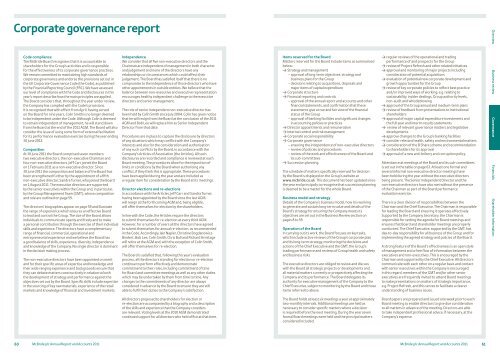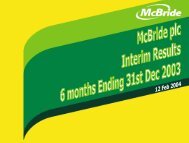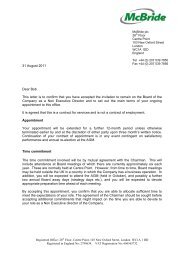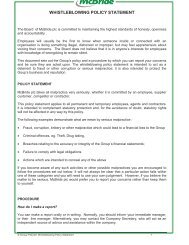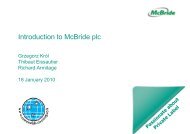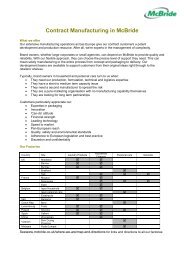pdf (2MB) - McBride
pdf (2MB) - McBride
pdf (2MB) - McBride
- No tags were found...
Create successful ePaper yourself
Turn your PDF publications into a flip-book with our unique Google optimized e-Paper software.
Corporate governance reportCode complianceThe <strong>McBride</strong> Board recognises that it is accountable toshareholders for the Group’s activities and is responsiblefor the effectiveness of its corporate governance practices.We remain committed to maintaining high standards ofcorporate governance and endorse the provisions set out inthe UK Corporate Governance Code (the Code), as publishedby the Financial Reporting Council (FRC). We have assessedour level of compliance with the Code and disclosures in thisyear’s report describe how the main principles are applied.The Board considers that, throughout the year under review,the Company has complied with the Code’s provisions.It is recognised that with effect from April, having servedon the Board for nine years, Colin Smith is no longer deemedto be independent under the Code. Although Colin is deemedto remain independent of management, he will stand downfrom the Board at the end of the 2011 AGM. The Board will alsoconsider the issue of using some form of external facilitationfor its performance evaluation exercise during the year ending30 June 2012.CompositionAt 30 June 2011 the Board comprised seven members:two executive directors, the non-executive Chairman andfour non-executive directors. Jeff Carr joined the Boardon 1 February 2011 as a non-executive director. Since30 June 2011 the composition and balance of the Board hasbeen strengthened further by the appointment of a fifthnon-executive director, Sandra Turner, who joined the Boardon 1 August 2011. The executive directors are supportedby the senior executives within the Group and, in particular,by the Group Management Team (GMT), whose compositionand role are outlined on page 59.The directors’ biographies appear on page 59 and illustratethe range of experience which ensures an effective Boardto lead and control the Group. The size of the Board allowsindividuals to communicate openly and freely and to makea personal contribution through the exercise of their individualskills and experience. The directors have a complementaryrange of financial, commercial, operational andentrepreneurial experience and we believe the Board hasa good balance of skills, experience, diversity, independenceand knowledge of the Company. No single director is dominantin the decision making process.The non-executive directors have been appointed on meritand for their specific areas of expertise and knowledge andtheir wide ranging experience and backgrounds ensure thatthey can debate matters constructively in relation to boththe development of strategy and performance against theobjectives set out by the Board. Specific skills include expertisein the sourcing of key raw materials, experience of the retailmarkets and knowledge of financial and investment markets.IndependenceWe consider that all five non-executive directors and theChairman are independent of management in both characterand judgement and none of the directors have anyrelationships or circumstances which could affect theirjudgement. The Board has satisfied itself that there is nocompromise to the independence of those directors who haveother appointments in outside entities. We believe that thebalance between non-executive and executive representationencourages healthy independent challenge to the executivedirectors and senior management.The role of senior independent non-executive director hasbeen held by Colin Smith since July 2004. Colin has given noticethat he will resign from the Board at the conclusion of the 2011AGM and Bob Lee will replace him as Senior IndependentDirector from that date.Procedures are in place to capture the disclosure by directorsof any situations which may conflict with the Company’sinterests and also for the consideration and authorisationof any such conflicts by the Board, in accordance with theCompany’s Articles of Association (the Articles). All suchdisclosures are recorded and compliance is reviewed at eachBoard meeting. The procedures allow for the imposition oflimits or conditions by the Board when authorising anyconflict, if they think this is appropriate. These procedureshave been applied during the year and are included asa regular item for consideration by the Board at its meetings.Director elections and re-electionsIn accordance with the Articles, Jeff Carr and Sandra Turner,having been appointed by the Board since the last AGM,will resign at the forthcoming AGM and, being eligible,will offer themselves for election by the shareholders.In line with the Code, the Articles require the directorsto submit themselves for re-election at every third AGM.However, for a number of years all the directors have agreedto submit themselves for annual re-election, as recommendedin the Code. Accordingly, Iain Napier, Christine Bogdanowicz-Bindert, Bob Lee, Colin Smith, Chris Bull and Richard Armitagewill retire at the AGM and, with the exception of Colin Smith,will offer themselves for re-election.The Board is satisfied that, following this year’s evaluationprocess, all the directors standing for election or re-electioncontinue to perform effectively and demonstratecommitment to their roles, including commitment of timefor Board and committee meetings as well as any other dutieswhich may be undertaken by them from time to time. Anychanges to the commitments of any director are alwaysconsidered in advance by the Board to ensure they are stillable to fulfil their duties to the Company’s satisfaction.Items reserved for the BoardMatters reserved for the Board include items as summarisedbelow:> Strategy and management– approval of long-term objectives, strategy andbusiness plans for the Group– decisions relating to acquisitions, disposals andmajor items of capital expenditure> Corporate structure> Financial reporting and controls– approval of the annual report and accounts and otherfinancial statements, and confirmation that thesestatements give a true and fair view of the financialstatus of the Group– approval of banking facilities and significant changesin accounting policies or practices> Director appointments and remuneration> Internal control and risk management> Corporate social responsibility> Corporate governance– ensuring the independence of non-executive directors– review of policies and procedures– review of the work and effectiveness of the Board andits sub-committees> Succession planning.The schedule of matters specifically reserved for decisionby the Board is displayed on the Group’s website atwww.mcbride.co.uk. This document has been updated sincethe year end principally to recognise that succession planningis deemed to be a matter for the whole Board.Business model and strategyDetails of the Company’s business model, how it is workingto generate and sustain long-term value and details of theBoard’s strategy for ensuring the Company meets itsobjectives are set out in the Business Review section onpages 8 to 59.Operation of the BoardIn carrying out its work, the Board focuses on key tasks,which include active reviews of the Group’s corporate planand its long-term strategy, monitoring the decisions andactions of the Chief Executive and the GMT, the Group’strading performance and reviews of Group health and safetyand business risks.The executive directors are obliged to review and discusswith the Board all strategic projects or developments andall material matters currently or prospectively affecting theCompany and its performance. The Board delegates itsauthority for executive management of the Company to theChief Executive, subject to monitoring by the Board and thoseitems referred to above.> regular reviews of the operational and tradingperformance of and prospects for the Group> review of Project Refresh and other related initiatives> approval and monitoring of major projects includingconsideration of potential acquisitions> evaluation of potential new corporate development andgrowth opportunities for the Group> review of key corporate policies to reflect best practiceand/or improved ways of working; e.g. relating tosustainability, insider dealings, Group authority levels,non-audit and whistleblowing> approval of the Group annual and medium-term plans> review of feedback from presentations to institutionalshareholders> approval of major capital expenditure investments andthe full year and interim results statements> review of relevant governance matters and legislativedevelopments> approve changes to the Group’s banking facilities> consider relevant health, safety and environmental matters> consideration of the B Share scheme and recommendationto shareholders for its approval> approval of a new anti-bribery and corruption policy.Attendance at meetings of the Board and its sub-committeesis set out in the table on page 63. At least one formal andseveral informal non-executive director meetings havebeen held during the year without the executive directorsbeing present. The Senior Independent Director and thenon-executive directors have also met without the presenceof the Chairman as part of the Board performanceevaluation exercise.There is a clear division of responsibilities between theChairman and the Chief Executive. The Chairman is responsiblefor leading the Board and ensuring it operates effectively.Supported by the Company Secretary, the Chairman isresponsible for setting the agenda for Board meetings andensures that Board and shareholder meetings are properlyconducted. The Chief Executive, supported by the GMT, hasday-to-day responsibility for all business of the Group and forimplementing the agreed strategy and policies of the Board.A strong feature of the Board’s effectiveness is an open styleof management and a free flow of information between theexecutives and non-executives. This is encouraged by theChairman and supported by the Chief Executive. All directorscommunicate with each other on a regular basis and contactwith senior executives within the Company is encouraged.In this regard, members of the GMT and/or other seniorexecutives are frequently invited to attend Board meetingsto make presentations on matters of strategic importance,e.g. Project Refresh, and this serves to facilitate a clearerunderstanding of business issues.Overview Business review Governance Financials Shareholder informationAll directors proposed to shareholders for election orre-election are accompanied by a biography and a descriptionof the skills and experience that the Company considersare relevant. Voting levels at the 2010 AGM demonstratedcontinued support for all directors who held office at that time.The Board holds at least six meetings a year at approximatelytwo-monthly intervals. Additional meetings are held asnecessary to consider specific matters where a decisionis required before the next meeting. During the year sevenformal Board meetings were held and the principal mattersconsidered included:Board papers are prepared and issued one week prior to eachBoard meeting to enable directors to give due considerationto all matters in advance of the meeting. Directors are ableto take independent professional advice, if necessary, at theCompany’s expense.60 <strong>McBride</strong> plc Annual Report and Accounts 2011 <strong>McBride</strong> plc Annual Report and Accounts 2011 61


